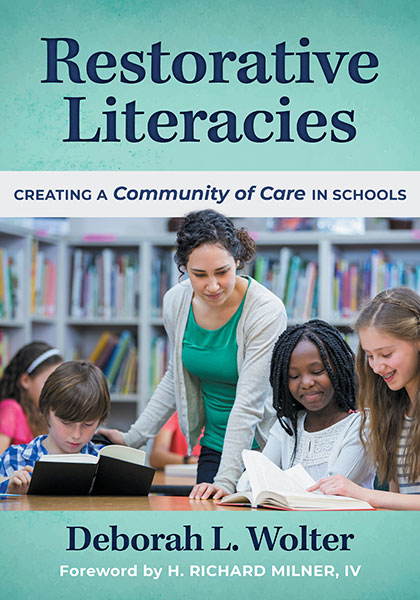Professors: Request an Exam Copy
Print copies available for US orders only. For orders outside the US, see our international distributors.
Foreword by: H. Richard Milner IV
Publication Date: March 12, 2021
Pages: 160
Series: Language and Literacy Series

Through eight compelling stories of restorative literacies, Wolter explores the complex relationships among cognition, metacognition, identity, behavior in schools, and literacies. Based on the principles of restorative justice, restorative literacies are designed to help educators repair harm, restore relationships, and expand the concept of literacy for some of our most disenfranchised and disengaged students. Restorative literacies are not just about growing readers and writers per se. They are about creating a community of care that involves students, teachers, administrators, and families so that all students experience racially, culturally, linguistically, and economically responsive instruction in multiple forms of literacies. Drawing on the author’s rich experiences cultivating a love of reading among her students and studying the practices of other educators, Restorative Literacies advances a provocative set of examples about centering the voice and stories of people in our quest to humanize and reimagine how we care for, about, and with others.
Book Features:
Deborah L. Wolter is a retired literacy consultant for Student Intervention and Support Services in Ann Arbor (Michigan) Public Schools. Her books include Reading Upside Down: Identifying and Addressing Opportunity Gaps in Literacy Instruction. Visit the author's website at deborahwolter.com.
“Those who take the time to explore this text will find themselves the beneficiary of the wealth that ‘plurality of literacy’ can yield. Those who take the time to apply Wolter’s work will find themselves shedding ethnocentrism and opening a treasure trove of identities, communities, abilities, and literacies that students already own. Readers will discover not just how to begin the work of creating caring communities in schools, but also why restorative literacy is important for our students and ourselves as well.”
—Teachers College Record
“Restorative Literacies offers a refreshing perspective on the power of story in cultivating emancipatory, restorative, and transformative contexts of learning, teaching, and development….During these times of civil and civic unrest, this is the book we need in education.”
—From the Foreword by H. Richard Milner IV, Cornelius Vanderbilt Chair of Education, Vanderbilt University
“Wolter offers educators a definitive deep dive into transforming a classroom into a vital and inclusive space. Through storytelling and empowering the voices of students, Restorative Literacies takes restorative practices beyond ‘managing’ behavior and towards creating classrooms that honor human dignity and the uniqueness of every young person’s experience.”
—John Bailie, president, IIRP Graduate School
Contents
Foreword H. Richard Milner IV vii
Preface: Everyone Has a Story ix
Whose Stories Get Told? x
Chapter Overview xi
Acknowledgments xv
1. What Are Restorative Literacies? 1
Response, Repair, and Restoration 2
How Restorative Justice Informs Restorative Literacies 3
Considering the Community 4
Relationships Among Identity, Behavior, and Literacies 5
Humanity, Justice, and a Natural Sense of Curiosity 7
Children’s Rights to Read 8
Relationships Among Responsive Teaching, Sustainability, and Restorative Practices 10
Restorative Literacies 13
2. Noticing the Language of Stories 15
Noticing the Language of Stories 16
Hearing the Language of Silence 19
Watching for Deficit Language 21
Hearing the Language of Race 22
Listening to Goals Instead of Systems 24
3. Compassionate Listening 28
Active Listening and Observing 29
Multiple Lenses 32
Developing Relationships 36
Trauma-Informed Listening 37
Responding to Difficult Behavior 38
Upholding Voices 40
4. Thinking About Literacies 42
Defining Literacies 43
Expanding the Literary Canon 45
Minding Gaps Between Reading Processes and Reading Instruction 50
Literacies in Context 56
5. Restoring Relationships 58
Testing and Vulnerability 59
Fostering Love of Literacies 60
Literacies in Communities and Schools 61
Access, Library Culture, and Diversity 62
Motivation and Engagement 65
Fostering Choice in Reading 67
Scaffolding Strategic Reading 71
Time and Space for Voluminous Reading 72
6. Repairing Harm 74
Dismantling Labels and Categories 75
Groups and Circles 78
Characters in a Restorative Circle 82
Restorative Circles With Multiple Lenses 83
Restorative Circles on Disciplinary Literacy 84
Strategic Reading in Restorative Circles 86
Thoughtfully Choosing and Abandoning Books 87
7. Strengthening Learning With Agency 89
Deeper Inclusion 91
Inquiry and Equity 92
Active Learning and Agency 95
8. Developing Leadership and Sustainability 98
Defining Leadership 99
Toward Sharing Power 101
Opportunities for Developing Leadership 102
A New Collaboration 104
9. Recognizing Literacies and Identities 108
Uncovering Identities 109
Decentering Whiteness 111
Toxic Positivity 115
Fostering Readers’ Identities 116
Conclusion: Restorative Literacies and Restorative Care 118
Stories of Humanity 119
References 122
Index 135
About the Author 144
Professors: Request an Exam Copy
Print copies available for US orders only. For orders outside the US, see our international distributors.